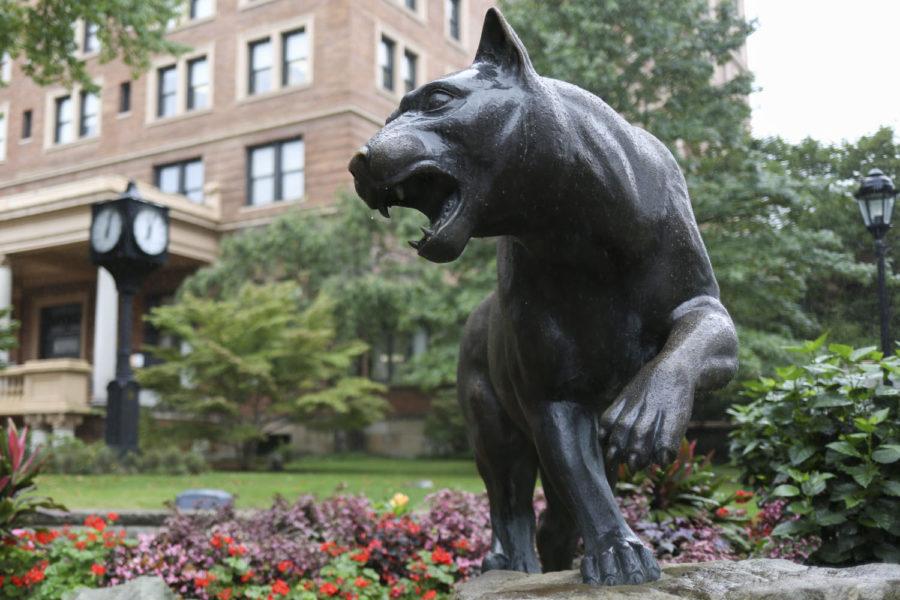Just because the panther is a statue, it doesn’t mean it hasn’t changed.
The panther was chosen as our mascot because of its intimidating nature, its nativity to the Pittsburgh region and its ancient standing as a noble animal, but most importantly it was chosen because no other university used it as a mascot at the time, according to George M.P. Baird on Pitt’s athletic website.
And with nearly 20 physical representations of panthers on and around Pitt’s campus, it seems almost natural to look into the history of some of them for the Homecoming edition.
Millennium Panther
By its sheer size and command over Pitt’s campus alone, this panther statue looks like it’s been a part of the University since its inception. In reality, it was only erected in 2001.
As a gift to the University, Student Government Board dropped $72,000 on this 10.5-foot long bronze cast panther statue to commemorate the new millennium. Sculpted in Parma, Italy, by Miriani Guido, the statue was placed outside the WPU in 2001.
And not only is there a statue there, but SGB buried a time capsule underneath it to be opened in 2051. We have a long way to go until we can take a peek at what’s inside, but for now we can at least rub its nose before an exam or an athletic game against a Pitt rival for good luck.
Petersen Event Center
On upper campus, another bronze cast statue sits outside the Petersen Events Center. The Pete has served as the men’s and women’s basketball teams’ home arena since 2002, following their move from the Fitzgerald Field House.
This version of the mascot is a nod to Panthers sports history. Thomas N. Mitrakos based his design on the annual trophy given for the Pitt Varsity Letter Club Awardees of Distinction. The life-size model sits on the graveyard of Pitt Stadium, the former home of the Pitt Panthers football team that was demolished in 1999. The granite base of the statue features the retired jersey numbers of Pitt football legends.
The Petersen Events Center panther has an identical twin across the river on the North Shore, just outside Gate A of Heinz Field, and was dedicated in the same year.
Homecoming Fiberglass
Perhaps the most relevant panthers for this time of year are the “Homecoming Panthers” themselves, introduced by SGB in 2008.
Deemed the “most controversial project” of the semester, the 10 fiberglass panthers — intended to be redecorated for homecoming each year by various clubs on campus — cost a total of $60,000.
Originally intended for a 2007 Homecoming unveiling ten years ago, the production delays of the statues from Calgary, Canada, caused a January release in 2008 instead.
While they were cause for debate a decade ago, today the panthers are scattered around campus in forgotten corners. TPN and WPTS currently keep their panthers across from the elevators on the fourth floor of the William Pitt Union.
Cathedral of Learning Fountain
Because the Cathedral can be so sublime, visitors often miss what’s right in front of them when walking into the Cathedral. On the Bigelow side, there’s a fountain in which a panther head spews out water.
It is unknown whether Joseph Gattoni — who did the stonework for the Cathedral — was involved in the creation of the panther head, but it’s impressive nonetheless.
Panther Hollow
Guarding the Panther Hollow Bridge in Schenley Park are four cast bronze panther statues that were made in 1897 by Giuseppe Moretti — the same man who sculpted the controversial Stephen Foster Memorial which is located over by the Carnegie Library on Forbes.
These four statues existed before Pitt moved from Pittsburgh’s North Side to Oakland and were the inspiration behind some of the University’s logos. Moretti also sculpted another panther, which is actually on campus — and is now encased in the Tansky Family Lounge on the first floor of the William Pitt Union.


